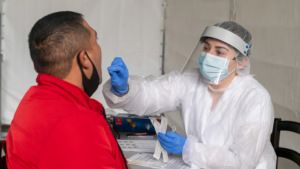News
PCR testing capacity unchanged despite reduced demand
This article is more than 4 years old.
With more people vaccinated and the increased availability of quick tests, the need for a PCR test has declined

Five respiratory illnesses are sweeping Denmark. Photo: Konstantin Ventslavovich
Figures presented by Statens Serum Institut demonstrate that the number of PCR tests has fallen: from around 175,000 a day two months ago to 150,000 this past week.
While the number of PCR tests has decreased, quick tests remain popular. Even though a PCR test is a more reliable indicator than a quick test, the downside is that it takes up to 12-24 hours before you receive the test result.
The primary reason for the fall is that more and more people are vaccinated, suggests Per Sabro, a medical executive at Central Jutland Region, but there are reasons.
“To obtain a valid corona passport people chose the fast, but less accurate quick tests,” he told DR.
Reduce test capacity
Jes Søgaard, a health economist at SDU, called it “a natural development” in an interview with DR.
“When we vaccinate more, the need for testing decreases,” he added, suggesting the testing capacity should be reduced as “it is very expensive”.
For the time being, the Justice Ministry disagrees, even though there are several PCR test sites where the capacity and staff are not being fully utilised.
“We will adjust the capacity when we have seen a decline over a long period of time. But it is too early to conclude now, ” the justice minister, Nick Hækkerup, told DR.










































